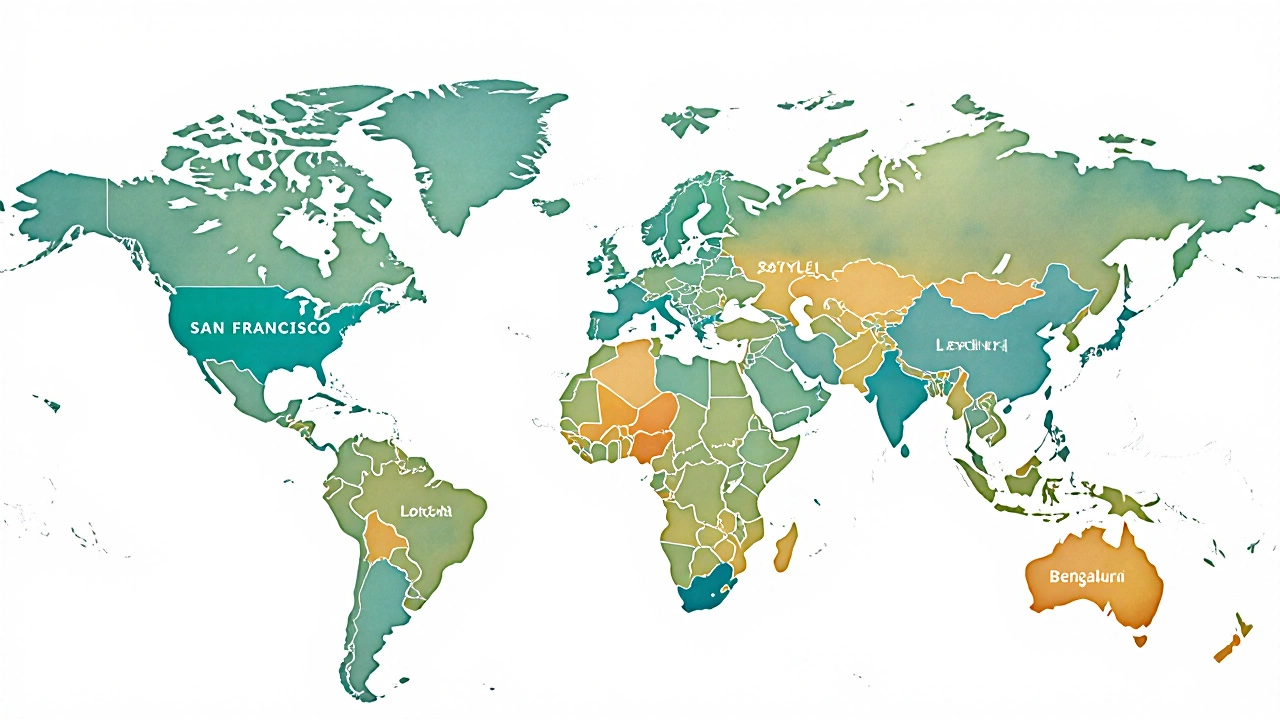Developer Salary Estimator
Estimate Your Developer Salary
Your Estimated Salary
When people ask, software developer is a professional who writes, tests, and maintains code that powers apps, websites, and devices, the answer isn’t a simple yes or no. Pay varies wildly based on skill set, location, experience, and the type of work you do. This guide breaks down the most common factors, shows real‑world numbers, and gives practical steps to turn your coding chops into a solid paycheck.
Key Takeaways
- In 2025 the global median coding salary for full‑time developers is about US$95,000, but top markets push the median above US$130,000.
- Entry‑level roles start around US$55k‑$70k, mid‑level range US$90k‑$120k, and senior/lead positions often exceed US$150k.
- Location still matters: U.S. tech hubs, Western Europe, and Australia pay the most, while emerging markets offer lower base pay but lower cost of living.
- Specializing in high‑demand languages (e.g., Rust, Go, TypeScript) or industries (fintech, AI, cybersecurity) can add 15‑30% to your earnings.
- Freelancing or remote contract work can rival or surpass salaried jobs when you master client acquisition and rate negotiation.
How Coding Salaries Are Measured
First, understand what “salary” actually includes. Salary is a regular cash compensation paid by an employer, usually expressed as an annual figure. Most reports also bundle:
- Base pay - the guaranteed amount before bonuses.
- Bonuses - performance‑based cash, often 5‑20% of base.
- Equity or stock options - common in startups and large tech firms.
- Benefits - health, retirement, paid time off, which can be valued at 20‑30% of cash compensation.
When we quote a figure like US$95,000, we’re typically referring to base pay only. Adding bonuses and equity can push total compensation (TC) into the six‑figure range for many mid‑level engineers.
Salary by Experience Level
Experience is the single biggest driver of pay. Below is a snapshot from the 2024 Stack Overflow Developer Survey and the Hired 2025 Salary Report.
| Experience Level | Typical Base Salary (US$) | Typical Total Compensation (US$) |
|---|---|---|
| Entry (0‑2 years) | 55,000-70,000 | 65,000-85,000 |
| Mid (3‑5 years) | 90,000-120,000 | 110,000-150,000 |
| Senior (6‑9 years) | 130,000-160,000 | 160,000-200,000 |
| Lead / Architect (10+ years) | 170,000-210,000 | 210,000-270,000 |
Notice the jump from mid‑level to senior: beyond raw coding, you start influencing architecture, mentoring, and project budgeting, which commands a premium.

Salary by Region
Geography still matters, even in a world where remote work is common. The table below aggregates data from Glassdoor, Payscale, and local government labor stats for 2025.
| Country / Region | Median Base Salary | Cost‑of‑Living Adjustment (COLA) |
|---|---|---|
| United States (SanFrancisco, Seattle) | 130,000-160,000 | +30% |
| Canada (Toronto, Vancouver) | 95,000-120,000 | +10% |
| Australia (Sydney, Melbourne) | 110,000-140,000 | +15% |
| United Kingdom (London) | 80,000-110,000 | +8% |
| Germany (Berlin, Munich) | 85,000-115,000 | +12% |
| India (Bengaluru, Hyderabad) | 25,000-45,000 | ‑30% |
| NewZealand (Auckland, Wellington) | 90,000-120,000 | +5% |
Even after adjusting for living costs, developers in high‑tech hubs still pull in more cash, mainly because companies compete for scarce talent. If you can work remotely, targeting those markets can dramatically boost your earnings.
Programming Language and Industry Influence
Not all code is created equal in the eye of a hiring manager. Programming Language is a specific syntax and set of rules used to write software can act as a salary multiplier.
- High‑pay languages: Rust, Go, Kotlin, TypeScript, and Swift often command 10‑20% higher offers because of their niche demand.
- Legacy workhorses: Java, C#, and Python remain solid choices but their premiums are smaller unless paired with specialized domains.
Industry refers to the vertical market a developer serves, such as finance, healthcare, or gaming.
- Fintech & AI: Median base salaries hover around US$140k‑$160k, largely due to data‑intensive workloads and regulatory stakes.
- E‑commerce & SaaS: Offers range US$110k‑$130k, with generous equity options.
- Gaming & Entertainment: Often lower base (US$90k‑$110k) but can include profit‑sharing bonuses.
Choosing a high‑pay language and aligning with a lucrative industry can be a faster route to a bigger paycheck than simply chasing years of experience.
Freelance vs. Full‑Time: Which Pays More?
Many developers wonder if contract work or gig platforms beat a traditional salary. Freelance Developer is a self‑employed coder who bills clients per hour or per project enjoys flexibility, but earnings depend on hustle and market positioning.
- Hourly rates: In 2025, North American freelancers charge US$80‑$150/hr for specialized work. European rates sit at US$60‑$120/hr, while Asia‑Pacific averages US$40‑$80/hr.
- Project size: Large SaaS integrations can bring $20k‑$50k per project, but they also require a longer sales cycle.
- Risk factor: No paid holidays, health benefits, or guaranteed income. Successful freelancers offset this with higher rates and multiple clients.
If you can secure a steady stream of contracts, freelancing can surpass salaried earnings, especially when you niche down (e.g., cloud‑migration consulting).

Ways to Boost Your Coding Income
- Master a high‑demand language - enroll in a Rust or Go bootcamp and showcase real projects on GitHub.
- Earn certifications - AWS Certified Solutions Architect, Google Cloud Professional Data Engineer, or Certified Kubernetes Administrator can add $10k‑$20k to offers.
- Shift to a high‑pay industry - target fintech, AI, or cybersecurity roles that value security‑critical code.
- Negotiate equity - at startups, a modest 0.1% stake can be worth $50k‑$200k after a liquidity event.
- Consider remote work - apply to companies in SanFrancisco or London while living in a lower‑cost city.
- Take on side gigs - build a niche SaaS tool, sell plugins on marketplaces, or teach coding workshops.
Each of these steps adds a layer of value to your profile, making it easier to command the salary you deserve.
Common Pitfalls to Avoid
- Assuming a title alone guarantees pay - a “Senior Engineer” at a small startup may earn less than a “Mid‑Level Engineer” at a FAANG firm.
- Overlooking total compensation - ignoring equity or bonuses can underestimate the real earning potential.
- Sticking to one language forever - market demand shifts; stay adaptable.
- Neglecting negotiation - many first‑year offers leave room for a 5‑10% bump if you ask respectfully.
Next Steps & Resources
Ready to turn curiosity into cash? Here’s a quick checklist:
- Visit salary transparency sites (Glassdoor, Levels.fyi, Hired) and filter by role, location, and experience.
- Update your LinkedIn profile to highlight high‑pay languages and industry projects.
- Pick one certification or bootcamp and set a 3‑month learning goal.
- Draft a negotiation script - practice the “value‑based” approach with a friend.
- If freelancing appeals, create a portfolio site, set a baseline hourly rate, and sign up on platforms like Toptal or Upwork.
By following this roadmap, you’ll have concrete data, a stronger skill set, and a clear plan to negotiate the pay you deserve.
Frequently Asked Questions
What is the average salary for a junior developer in 2025?
In 2025 the median base pay for a junior (0‑2years) developer ranges from US$55,000 to US$70,000 in North America, with total compensation usually landing between US$65,000 and US$85,000 when bonuses and benefits are included.
Do programming languages really affect salary?
Yes. Languages with limited talent pools-like Rust, Go, and Kotlin-often carry a 10‑20% premium. Conversely, widely taught languages such as Java and Python provide steady demand but smaller salary bumps unless paired with a high‑value industry.
Can remote work increase my earnings?
Absolutely. Remote developers can apply to high‑pay markets (e.g., SanFrancisco, London) while living in lower‑cost cities. Companies often adjust salaries to market rates, so you can earn 15‑30% more than local equivalents.
Is freelancing more lucrative than a full‑time job?
Freelancing can out‑earn salaried roles when you secure high‑rate contracts and maintain a steady client pipeline. However, it comes with income volatility, no employer‑provided benefits, and the need for self‑marketing and tax management.
How much can equity add to my compensation?
Equity varies widely. A 0.1% stake in a SeriesB startup valued at $1billion could be worth $1million on paper, translating to $50k‑$200k in real cash after a liquidity event, depending on vesting and exit timing.
